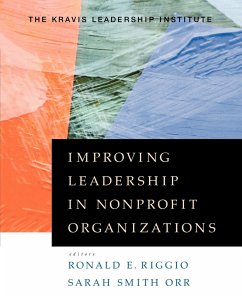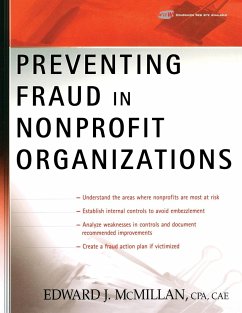
Nonprofit Finance for Hard Times
Leadership Strategies When Economies Falter
Versandkostenfrei!
Versandfertig in über 4 Wochen
33,99 €
inkl. MwSt.
Weitere Ausgaben:

PAYBACK Punkte
17 °P sammeln!
Praise for Nonprofit Finance for Hard Times "Nonprofits provide a wide range of essential services across this nation. Economic crisis can cripple the financial health of these nonprofits just as the crisis itself is heightening the demand for their services. Nonprofit Finance for Hard Times is a thorough yet wide-ranging analysis of the intersections between economic storms and nonprofit capacity. More importantly, it provides a unique framework for developing strategies to diversify revenue sources in ways that will increase a nonprofit's abilities to withstand the buffeting of those storms....
Praise for Nonprofit Finance for Hard Times "Nonprofits provide a wide range of essential services across this nation. Economic crisis can cripple the financial health of these nonprofits just as the crisis itself is heightening the demand for their services. Nonprofit Finance for Hard Times is a thorough yet wide-ranging analysis of the intersections between economic storms and nonprofit capacity. More importantly, it provides a unique framework for developing strategies to diversify revenue sources in ways that will increase a nonprofit's abilities to withstand the buffeting of those storms. Nonprofit Finance for Hard Times is a must read for nonprofit managers, Boards, and the philanthropists who are invested in their success." --The Honorable and Mrs. Rudolph W. Giuliani "Nonprofit Finance for Hard Times challenges the nonprofit sector to seize opportunity from the jaws of economic crisis. Premised on an explicit philosophy that places community engagement at the heart of both nonprofit action and philanthropic giving, this book provides both financial strategy for nonprofit organizational growth and core concepts of leadership that will deeply embed community participation in the structure and success of nonprofits. Stronger nonprofits and more effective philanthropy need not be left to the fates. Nonprofit Finance for Hard Times provides strategy and leadership to ensure that institutions that are dedicated to community well-being do not themselves fall ill in economic crisis. The data are rigorous, the analysis is astute, and the strategies can and should be part of the planning process for nonprofits and philanthropists alike." --Susan Braun, School Administrator, The Waldorf School of Garden City, Former CFO, Citigroup Investment Services













